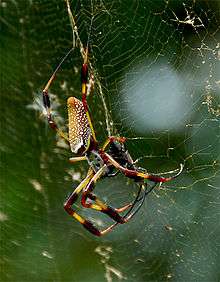Arachnology
Arachnology is the scientific study of spiders and related animals such as scorpions, pseudoscorpions, and harvestmen, collectively called arachnids. Those who study spiders and other arachnids are arachnologists.
The word arachnology derives from Greek ἀράχνη, arachnē, "spider"; and -λογία, -logia.
Arachnology as a science
Arachnologists are primarily responsible for classifying arachnids and studying aspects of their biology. In the popular imagination they are sometimes referred to as 'spider experts'. Disciplines within arachnology include naming species and determining their evolutionary relationships to one another (taxonomy and systematics), studying how they interact with other members of their species and/or their environment (behavioural ecology), or how they are distributed in different regions and habitats (faunistics). Other arachnologists perform research on the anatomy or physiology of arachnids, including the venom of spiders and scorpions. Others study the impact of spiders in agricultural ecosystems and whether they can be used as biological control agents.
Subdisciplines
Arachnology can be broken down into more specific specialties. These topics include:
- acarology - the study of ticks and mites.
- araneology - the study of spiders.
- scorpiology - the study of scorpions.
Arachnological societies
Arachnologists are served by a number of scientific societies, both national and international in scope. Their main role is to encourage the exchange of ideas between researchers, to organise meetings and congresses, and in a number of cases to publish academic journals. Some are also involved in outreach programs, like the European spider of the year, which raise awareness of these animals among the general public.
- American Arachnological Society (AAS)
- British Arachnological Society (BAS)
- International Society of Arachnology (ISA)
- Iranian Arachnological Society (IAS)
- African Arachnological Society (AFRAS)
- Arachnologia Belgica - Belgian Arachnological Society (ARABEL)
- The Arachnological Society of Japan (ASJ)
- Arachnologische Gesellschaft - Central European Arachnological Society
- Asian Society of Arachnology (ASA)
- L'Association Francaise d'Arachnologie - French Society of Arachnology (AsFrA)
- The Australasian Arachnological Society
- Czech Arachnological Society
- Deutsche Arachnologische Gesellschaft e. V. - German Arachnologic Society (DeArGe)
- European Society of Arachnology (ESA)
- Grupo Ibérico de Aracnologia - Spanish Society of Arachnology (Iberian Peninsula)
- Indian Society of Arachnology
- Magyar Arachnolgia - Hungarian Arachnology
Arachnological journals
Scientific journals devoted to the study of arachnids include:
Popular arachnology
In the 1970s, arachnids - particularly tarantulas - started to become popular as exotic pets. Many tarantulas thus become more widely known by their common names such as the Mexican redknee tarantula (Brachypelma smithi).
Various societies now focus on the husbandry, care, study and captive breeding of tarantulas, and other arachnids. They also typically produce journals or newsletters with articles and advice on these subjects.
- British Tarantula Society
- The American Tarantula Society
See also
- Cultural depictions of spiders
- Entomology
- Category:Arachnologists
External Information Links
| At Wikiversity, you can learn more and teach others about Arachnology at the Department of Arachnology |

